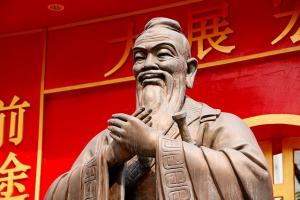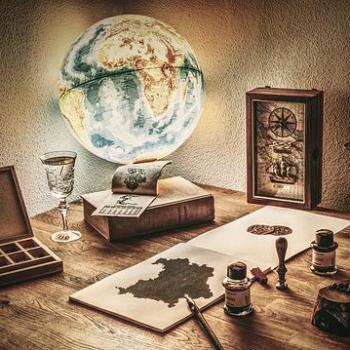 Last month, while leafing through the pages of the latest issue of Modern Reformation—a publication to which I periodically contribute—I came across an interesting piece entitled “Why You Should Not Buy Into Confucianism” by a former professor of mine, the esteemed Lutheran scholar and lawyer John Warwick Montgomery.
Last month, while leafing through the pages of the latest issue of Modern Reformation—a publication to which I periodically contribute—I came across an interesting piece entitled “Why You Should Not Buy Into Confucianism” by a former professor of mine, the esteemed Lutheran scholar and lawyer John Warwick Montgomery.
In essence, Montgomery sets out to “illustrate the gulf separating Confucianism and biblical religion by way of several Chinese word studies”—the Tao, rén (benevolence), li (righteousness), ān (tranquility), ci (benevolence), and zhōng (loyalty). These concepts as used in Confucianism, Montgomery contends, carry with them a variety of connotations that make them difficult to map seamlessly onto classical Christian virtues. In so doing, Montgomery (to my mind justifiably) challenges a tendency of those working in the field of “theology of religions”—pluralist theologians such as John Hick and D.Z. Phillips come in for explicit critique—to collapse rival faith traditions into a kind of undifferentiated metaphysical spirituality, one that papers over important distinctions.
That being said, it is probably worth noting that Confucian thought (at least as I understand it) is not primarily oriented toward the salvation of the individual—a central concern of Lutheran theology. Accordingly, it strikes me as perhaps something of a category error to evaluate Confucianism on that basis. Is there a more fruitful approach to inquiry?
It is somewhat curious that Montgomery, in the course of his word studies, does not consider the complex of terms that has historically been a key point of tension in Christian-Confucian dialogue, dating back to the Chinese Rites Controversy of the late sixteenth century. Upon the arrival of Matteo Ricci and other Jesuit missionaries in China, questions immediately arose about how the God of Christianity should be named in the new language. Early on, indigenous Chinese Christians adopted the moniker Tianzhu, “Lord of Heaven”(天主). Left undefined, however, was the relationship between Tianzhu and the traditional Confucian terms used to designate the wellsprings of the metaphysical order—Tian, or “Heaven” (天), and Shangdi, or “Sovereign on High” (上帝).
While both of these concepts—particularly Tian, as even a cursory reader of Confucius’s Analects cannot help but notice—loom large in traditional Confucian thought, questions persisted about whether Christian adoption of these terms risked collapsing the God of Abraham, Isaac, and Jacob into an utterly impersonal Absolute. Clearly, this long-ago controversy parallels Montgomery’s concern for apprehending the full implications of terms, not simply their rough translation equivalents.
But regardless of one’s thoughts on the controversy itself, the debate sheds light on an important aspect of the Confucian tradition: the fact that a central ethical concern of Confucian thought is the maintenance of right relationships between and within the various hierarchical orders that structure the cosmos. The Confucian subject has duties towards both his superior and towards Tian, after all. And on this front, thoughtful Christian engagement with the Confucian tradition strikes me as important—even urgent.
For a variety of work-related reasons, I’ve become increasingly interested in the philosophical underpinnings of the modern Chinese state, which have clearly evolved beyond the overtly revolutionary Maoism of the mid-twentieth century. In particular, recent years have witnessed a revival of interest within China in traditional Confucian thought. Some voices, such as Jiang Qing, are overtly critical of the Chinese Communist Party’s perceived displacement of traditional Confucian thought with Marxist principles.
Others, however, are interested in developing a synthesis between the Confucian and Marxist intellectual traditions, and glimpse in this rapprochement the possibility of a genuinely compelling alternative to Western philosophical fragmentation. For entry-level readers like myself, an accessible treatment of this “New Confucian” turn is Daniel Bell and Wang Pei’s new book Just Hierarchy: Why Social Hierarchies Matter in China and the Rest of the World, which serves as a kind of philosophical apologetic for the contemporary Chinese model of governance viewed through a Confucian lens.
Bell and Wang are quite open about the fact that their project may come off as radically alien to Western liberal minds. But “the choice today,” they write, “is not between a society with no hierarchies and one with hierarchies, but rather between a society with unjust hierarchies that perpetuate unjust power structures and one with just hierarchies that serve morally desirable purposes.” The criteria for adjudicating the legitimacy or illegitimacy of any particular hierarchies may vary based on context—some hierarchies are pure hierarchies of merit, while others draw distinctions on the basis of filial respect—but a zero-hierarchy state, for Bell and Wang, is incompatible with genuine flourishing. Surely, at the very least, one must distinguish between the interests of human beings and those of machines.
The fundamental need for such hierarchies, ultimately, underpins the legitimacy of the Chinese state: Bell and Wang conclude their book by invoking the terrifying specter of artificial intelligence systems gone rogue, a specter that can only be vanquished through commitment to a political program capable of unifying humanity’s interests. “If we are unlucky, the last war involving humans will be a clash between the Chinese Communist Party and Google’s unfriendly creation, and for the sake of humanity we need to pray for the victory of the CCP.” The choice, for Bell and Wang, is either totalitarianism or annihilationism.
Given China’s history of crushing internal dissent, there is an obvious temptation for outsiders to write all this off as merely water-carrying for a cynical, self-dealing regime of Chinese elites (after all, Bell himself teaches at Tsinghua University). But a closer, more comparative look at this sort of argument suggests otherwise. Specifically, one can hear in Bell and Wang’s work the echoes of certain Western critiques of cultural decadence, which themselves culminate in a posited apocalyptic choice between totalizing hierarchy and chaotic violence.
Modern-day proponents of Catholic integralism are keen to build on John Henry Newman’s well-known adage that “[t]here is no medium, in true philosophy, between Atheism and Catholicism.” For integralists, the fundamental political choice must be between a self-consciously Catholic polity and an atomizing liberalism that tends toward the annihilation of the human person. That particular claim, to be sure, is not exactly novel: in Robert Hugh Benson’s 1911 “sci-fi” novel The Dawn of All, authorial stand-in characters justify the emergence of a global Catholic imperium as the only possible form of social order.
[T]he only foundation of society at the present day is Catholicism. You see we know now that Catholicism is true. It has reasserted itself finally. Every other scheme has been tried and has failed; and Catholicism, though it has never died, has once more been universally accepted. Even heathen countries accept it de facto as the scheme on which the life of the human race is built. Very well, then, the man who strikes at Catholicism strikes at society. If he had his way society would crumble down again. Then what can Catholic society do except defend itself, even by the death penalty?
For my own part, I find this kind of quasi-Manichaean dichotomy between total chaos and absolute order to be broadly unpersuasive. All human societies—even confessional or Confucian ones—permit their citizens a certain degree of individual autonomy, which may be employed for good ends or bad, and so all societies are capable of generating the very forces that may destabilize them. The Reformation, after all, gestated in the womb of medieval Catholicism, just as the Tiananmen Square protests grew out of Chinese Marxism.
But that is a very different question, of course, from whether societies ought to have the power to compel collective social action in the face of particular emergent threats. For Wang and Bell, that threat is artificial intelligence; for those of us in the U.S. today, it is the coronavirus pandemic. Would an America committed to “Confucian”—if not specifically Chinese—virtues have reacted to the disease differently? Could such a model make sense at all on Christian theological premises? These questions, to my mind, are worth contemplating.
All of that to say: while many of Montgomery’s points are well taken, I am not so sure that “buying into Confucianism” is a straightforward matter of substituting one religious tradition for another. Rather, the questions the Confucian tradition seeks to answer are, in many ways, fundamental questions of political-theological order. And just as Christians have long engaged in critical and careful treatment of political thinkers like Plato or Hume or Marx, it seems to me that it is well worth approaching Confucian texts in a spirit of charity.












